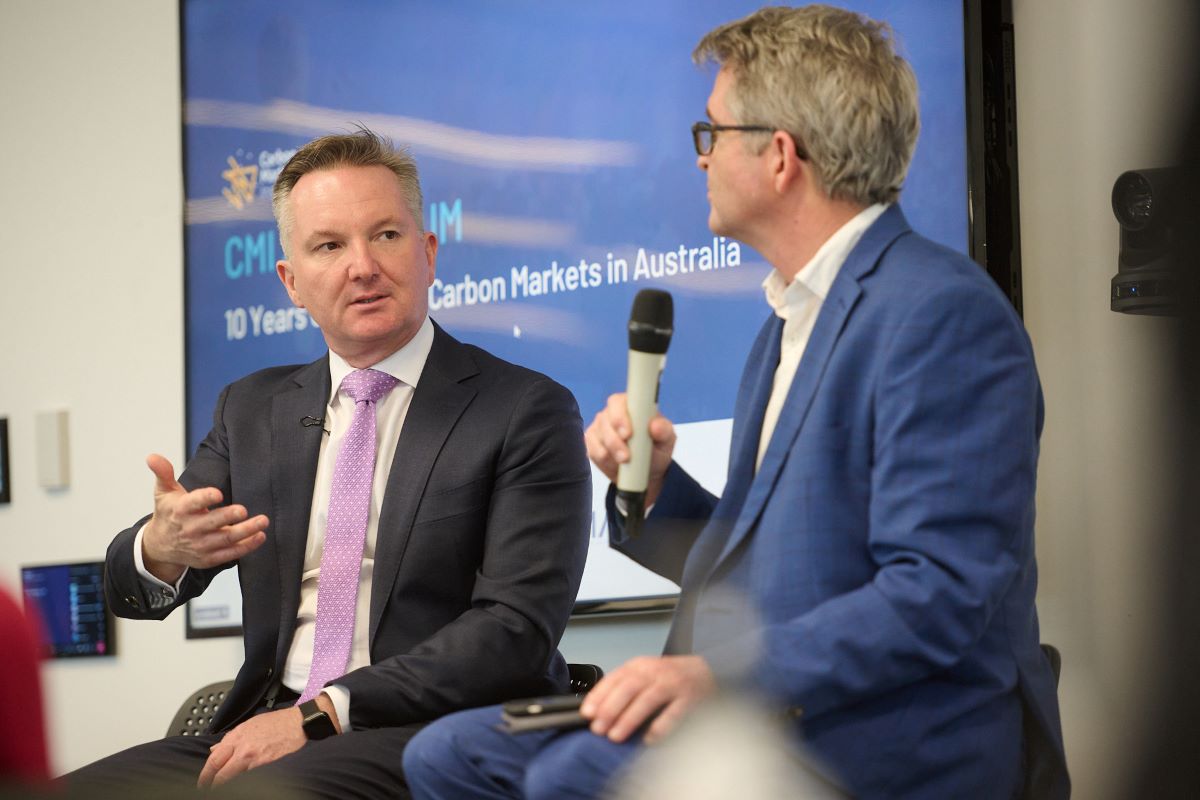The Carbon Market Institute’s inaugural Symposium recognised the ten year anniversary of the start of the Carbon Pricing Mechanism, initiating a decade of national carbon markets.
The event was an important moment to reflect on the history of Australian Climate Policy, but also to galvanise for what is a vital pivot point for the future of Australian business and emissions.
Ministerial Address
This year’s event featured a Ministerial Address by Hon. Chris Bowen MP, Minister for Climate Change & Energy, Australian Labor Party
About the Symposium
The Carbon Pricing Mechanism was one of the world’s first national emissions trading schemes with broad economic coverage, requiring liable entities to pay a price for their emissions under independently reviewed declining caps. Although repealed in July 2014, the scheme’s implementation and two-year operation was significant. It signalled the birth of Australian carbon markets which continued under the Emissions Reduction Fund and its Safeguard Mechanism. Key supporting institutions and policies like the Renewable Energy Target, the Clean Energy Finance Corporation, ARENA and the Climate Change Authority have since endured to a large extent.
This Symposium brought together industry stakeholders, academics, government officials and policy experts from across the political spectrum. The goal was to reflect on the lessons of the last decade for our challenge in this critical decade in the transition to net-zero emissions before 2050.
Speaker highlights
“A policy reset on climate action and energy is underway. A policy reset that is sensible and makes net zero achievable by 2050. One in which your sector will be very important players. One that will enable business and industry to make the most of the opportunities that climate action will bring. And we will achieve this together – government, CMI and all Australians.” – The Hon. Chris Bowen, Minister for Climate Change and Energy
“We’ve made a good start. The key will be to stick with what is working and do away with what isn’t, or we could be here in 10 years talking about the same thing.” – Adrian King, Partner, Climate Change & Sustainability, KPMG
“Including an emissions objective in national electricity law would be a useful thing in terms of guiding a range of decision-making processes across the three market bodies [the Australian Energy Market Operator, the Australian Energy Market Commission, and the Australian Energy Regulator].” – Anthea Harris, CEO, Energy Security Board
“We should be watching the carbon border adjustment mechanism in Europe, as a useful tool for Australia to consider.” – Tennant Reed, Head of Climate, Energy & Environment Policy, Australian Industry Group
“Given the potential demand source from Safeguard entities, and the interaction between ACCUs and Safeguard Mechanism Credits, the focus is on the design principles of the new safeguard policy. To respect and preserve Australia’s high integrity carbon market, the policy parameters around the Safeguard Mechanism and the resulting ‘new’ credits need to be robust. It is vital that the SMC’s incentivise the most efficient achievement of emission reductions to meet the 2030 international target.” – Raphael Wood, Managing Director, Market Advisory Group
“Carbon is a massive economic opportunity for Australia, but to realise the benefits we need to bring together demand and supply in a centralised, efficient marketplace. We also need to really scale private finance for carbon farming projects to supercharge supply of high-integrity ACCUs and help Australia’s carbon market deliver on its promise.” – Luke Donovan, Executive Director, Environmental Markets, Commonwealth Bank of Australia
“We are still stuck in the climate war paradigm. You need to bring the population with you. You need to talk about the relative role of regulation vs incentives vs markets. If you don’t have that, I don’t think we’re going to get there.” – Alison Reeve, Climate Change & Energy Deputy Program Director, Grattan Institute
“We’re still in a ‘capital light’ phase of the carbon market. Incentivising capital remains the primary challenge today.” – Andrew Grant, Chair, Tasman Environmental Markets
“The market is clearly at a stage where it can scale, but there’s a lot of work to be done to engage with the community to help them understand it.” – Amanda Cahill, CEO, The Next Economy
“The reason why we do farming is for environmental, social and economic core benefits. If we get that right, we will have quality credits.” – Rowan Foley, CEO, Aboriginal Carbon Foundation
Program, speakers and recordings
Panel 1: Lessons for Australian carbon market reform
Moderator: John Connor, CEO, Carbon Market Institute
Panel: Anthea Harris, CEO, Energy Security Board, Bret Harper, Head of Research, RepuTex Energy, Tennant Reed, Head of Climate, Energy & Environment Policy, Australian Industry Group, and Alison Reeve, Climate Change & Energy Deputy Program Director, Grattan Institute
Panel 2: Core and crosscutting Issues
Moderator: Andrew Grant, Chair, Tasman Environmental Markets
Panel: Amanda Cahill, CEO, The Next Economy, David Parker, Chair, Clean Energy Regulator, and Rowan Foley, CEO, Aboriginal Carbon Foundation
Panel 3: Linking markets & investors
Moderator: Megan Flynn, Partner, Pollination
Panel: Erwin Jackson, Director, Policy, Investor Group on Climate Change, Blair Comley, Net Zero Centre Lead & Partner, EY, and Anna Malos, Country Lead – Australia, Climateworks Centre
Unfortunately, no audio recording of the panel discussion
Panel 4: Key priorities of carbon market reform
Moderator: Anna Hancock, Head of Sustainability & Climate Change, EnergyAustralia
Panel: Adrian King, Partner, Climate Change & Sustainability, KPMG, Raphael Wood, Managing Director, Market Advisory Group, and Luke Donovan, Executive Director Power and Carbon Markets, Commonwealth Bank of Australia
Partner materials
Ten years on, the carbon market emerges from the political battleground an opinion article in The Australian by Barry Sterland, Partner, Energy Transition Leader, KPMG and John Connor, CEO, Carbon Market Institute.
The future of carbon markets in Australia (YouTube) featuring Vivek Dhar, CBA’s Director Mining and Energy Economics, discussed the future of carbon markets in Australia.
Closing the gap on emissions reduction – work to be done to get policy settings right (pdf) by Market Advisory Group (MAG)
2022 Symposium Partners

The Commonwealth Bank (ASX:CBA) is one of Australia’s leading providers of personal banking, business and institutional banking and share broking services.
We have a deep experience in key global carbon markets. We’re focused on supporting our clients as they transition their business models to a low carbon economy and ensure their operations are fit for the future.

KPMG has developed a leading global climate change and decarbonization practice that can deliver leading integrated solutions to clients.
We draw on KPMG global professionals with a wide range expertise – strategy, policy understanding, investment and deal execution, and climate reporting – to work collaboratively with clients on the journey to a low carbon future.

At MAG we strive to make the complex understood, to mitigate risk and maximise opportunity in the carbon market, aligned to our clients “why”.
We deliver transparency through the knowledge of our expert team. With a unique combination of rigorous analytical insight and on the-ground experience we offer a progressive perspective, innovative solutions, and nurture long term relationships.
Helping our clients to achieve their carbon goals and collectively working towards a more sustainable future for us all.


